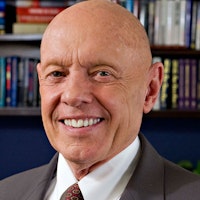Wisdom is the child of integrity—being integrated around principles. And integrity is the child of humility and courage.
Wisdom is the child of integrity—being integrated around principles. And integrity is the child of humility and courage.
Stephen R. Covey

Wisdom Is the Child of Integrity
Theme: Wisdom
Wisdom is the child of integrity—being integrated around principles. And integrity is the child of humility and courage. In fact you could say that humility is the mother of all the virtues because humility acknowledges that there are natural laws or principles that govern the universe. They are in charge. We are not. Pride teaches us that we are in charge. Humility teaches us to understand and live by principles, because they ultimately govern the consequences of our actions. If humility is the mother, courage is the father of wisdom. Because to truly live by these principles when they are contrary to social mores, norms, and values takes enormous courage…
Stephen R. Covey was born in Salt Lake City, Utah, on October 24, 1932, and he passed away on July 16, 2012. He was more than an educator and author; he was also a family man deeply rooted in his faith. Covey was a member of The Church of Jesus Christ of Latter-day Saints. His belief in God and universal principles significantly influenced his teachings and writings. Married to Sandra Merrill Covey for over 50 years, the couple had nine children. Covey's family life and faith were central to his understanding of leadership and personal effectiveness, themes he explored in books like "The 7 Habits of Highly Effective Families."
Covey was a professor at the Jon M. Huntsman School of Business at Utah State University at the time of his death. But he was best known for his book "The 7 Habits of Highly Effective People." This book was part of a broader collection of works that also includes titles like "First Things First," "Principle-Centered Leadership," and "The 8th Habit." These books weren't just about being effective in business; they were about how to live a balanced, meaningful life.
Stephen R. Covey left a lasting impression through his teachings and writings, but perhaps his most enduring legacy is the way he lived his life. He emphasized the importance of character, integrity, and ethical leadership. These were not just principles he talked about; they were principles he lived by. His lessons continue to influence people all over the world, encouraging them to lead lives that are not only effective but also grounded in good values.
The 8th Habit
Covey, Stephen R. [The 8th Habit—From Effectiveness to Greatness] pages 296-297.

Stephen R. Covey
Theme: Wisdom

About This Stephen R. Covey Quotation [Commentary]
Stephen R. Covey teaches that “wisdom is the child of integrity—being integrated around principles. And integrity is the child of humility and courage.” He presents wisdom as the natural outcome of a life centered around enduring truths. Integrity, defined as living in alignment with principles, does not arise on its own; it grows from the combined strength of humility and courage. Covey points to a clear order: wisdom depends on integrity, and integrity depends on an inner posture that recognizes truths greater than oneself and the strength to live by them.
In the extended passage, Stephen R. Covey explains that “humility acknowledges that there are natural laws or principles that govern the universe. They are in charge. We are not.” This humility is foundational because it opens the heart to realities that pride denies. Where pride falsely claims control, humility accepts that outcomes are governed by principles beyond personal will. Through this acceptance, one becomes able to “understand and live by principles,” which Covey identifies as essential for integrity. Humility leads not to passivity, but to a deeper willingness to act in harmony with the laws that truly govern life.
Courage is needed alongside humility because living by principles often requires standing apart from prevailing norms. Covey writes, “to truly live by these principles when they are contrary to social mores, norms, and values takes enormous courage.” It is courage that strengthens the commitment to integrity when external pressures challenge it. Together, humility and courage create the conditions in which wisdom can emerge. For Stephen R. Covey, wisdom is not merely knowing what is right but having the inner strength and sincerity to live by it.
An Additional Stephen R. Covey Quote [And Commentary]
Stephen R. Covey envisions the coming millennium as the “Age of Wisdom,” a time when humanity will be guided by deeper understanding and ethical clarity. He suggests this shift will be driven either by circumstances that humble people, an awakening of conscience, or both. As individuals and societies confront the consequences of pride and neglecting universal principles, Covey believes they will turn to wisdom as a stabilizing force. Rooted in humility, courage, and integrity, this wisdom offers a pathway to a more conscientious and principled way of living, aligning humanity with enduring truths to address the challenges of the modern world.
Related Quotes
Copyright © 2017 – 2026 LuminaryQuotes.com About Us